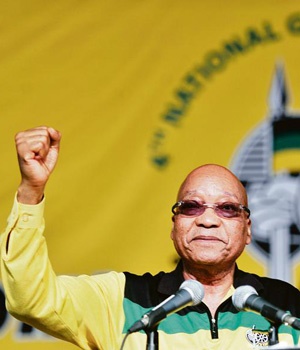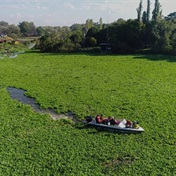
ANC branch, regional and provincial leaders have told City Press that the ANC is bleeding membership and losing electoral support because of self-inflicted wounds that include branch officials, senior party leaders and businesspeople seeking to use party structures to further private interests.
Members and leaders were this week reeling from President Jacob Zuma’s report that party membership had dropped dramatically from more than 1 million in 2012 to 769 000, partly due to “gatekeeping” and manipulation by branch leaders.
The party’s membership breakdown shows that the party lost 430 130 paying members (about 20%) since the party’s Mangaung conference in 2012.
Personal interest
Secretary-general Gwede Mantashe said membership increased in the run-up to conferences and dropped after them, because for those with personal interest to be elected into powerful positions, “voting power had become more important than building the organisation”.
Mantashe in his report cautioned about a drop below 60% in next year’s local government elections, saying that would be an indication of the demise of the movement.
“If the ANC declines below 60% in 2016, this would represent a psychological and political turning point that would be interpreted as an indication of the demise of the movement.”
Political analyst Susan Booysen said the drop in members could send a negative message about the party, but also wondered if the initial Mangaung conference numbers had not been inflated in the first place.
“It is actually a serious indictment on the current leadership to have allowed this organisation to slip this badly. That is one possibility. The other is that these figures were, to a large extent, inflated.”
Fictional branches
The figures coincided with the centenary of the organisation and the Mangaung conference, in the run-up to which KwaZulu-Natal in particular saw a massive increase.
There were many stories, said Booysen, of “fairy tale” branches, and the KwaZulu-Natal figures alone contributed 173 000 in the total decline of 430 000. That gave credence to the suspicion that there were fictional branches prior to the Mangaung conference, said Booysen.
“It poses serious questions about how the incumbent president [Zuma] was elected. [KwaZulu-Natal] is his province and that is quite an indictment that things are really falling apart there.”
City Press was told of several instances where the party had been trying to attend to gatekeeping problems.
Last weekend, the ANC’s top six leaders led members of the party’s national working committee to observe four regional conferences in Mpumalanga, where hundreds of members protested outside conference venues because they had been excluded.
This was despite a meeting between the top six and Mpumalanga leaders earlier in the week, where the majority of those who attended, including regional leaders, petitioned the ANC to allow the province to go to an early conference.
An employee of FNB was recently fired in Mpumalanga’s Groblersdal area for colluding with ANC members to process fraudulent membership forms.
An ordinary ANC member in the province’s Ehlanzeni region, which includes Nelspruit, was found with an FNB stamp, according to a former ANC regional leader currently working in the provincial government.
In the Eastern Cape’s Buffalo City metro, ANC provincial leaders are investigating a similar case of fraudulent membership forms, also implicating FNB employees.
In terms of the new system, according to an ANC provincial leader, only branch treasurers are responsible for depositing the joining fees of new members. Application forms are also meant to be assessed by the branch executive committee before being processed. Members would also be able to get membership cards at most in six months – unlike previously, when it took up to two years, according to another ANC provincial leader.
Internal fights
President Zuma said that when voters observed the internal fights from the outside, it created a perception that the ANC was a party of self-serving people.
Eastern Cape ANC provincial secretary Oscar Mabuyane said in an interview that the ANC could not be “comfortable relying on supporters instead of members to win votes”.
“Supporters swing and shift with the mood. It is only ANC members that cannot vote for another party,” said Mabuyane.
He said the weakening of ANC branches as a result of manipulation was quite glaring in the Eastern Cape.
“The fact that our membership is fluctuating is a direct response of membership manipulation and gatekeeping,” said Mabuyane.
Only the ANC’s three smallest provinces – North West, the Northern Cape and Western Cape – had managed to consistently grow membership numbers.
Mpumalanga ANC secretary Lucky Ndinisa said the emergence of a group in Mpumalanga called Save the ANC was as a result of the manipulation of membership in ANC structures.
“They are being kept outside the organisation, are not allowed to participate and their names are being removed from branch registers,” said Ndinisa.
Ineffective
It was a serious matter when members of the organisation were being blocked from participating, he added.
Ndinisa said the problem was predominantly at branch level, partly because the province’s political-school programme was ineffective.
A North West municipal councillor whose branch had collapsed but mysteriously managed to be represented by a delegate at the National General Council (NGC) said individuals were conducting “signature campaigns” to ensure that they attended the weekend meeting.
A signature campaign was an instance where branch leaders got members to sign the attendance register without attending the branch meeting, said the source.
An eThekwini delegate stood up in the plenary session over the weekend and queried the process of electing branch delegates in eThekwini, the ANC’s biggest region in terms of membership.
eThekwini had been unable to hold an elective conference on more than two occasions. Each time, the conference was disrupted by disgruntled members.
Mantashe said they would correct the administrative failures by introducing the new system, which would allow for officials to convert membership forms.
A document Mantashe presented to the 4 000 delegates attending the NGC said: “The aim is to provide a digital membership solution to streamline the entire membership life cycle and allow new people to join the ANC. The system is going through its final accreditation to ensure all the required security features are in place.”
He blamed the failure of branch secretaries to ensure that members renewed their memberships before they lapsed. But the membership crisis could also be linked to instability in various provinces.
In his report, Mantashe flagged tensions that had played out between groups since the highly contested July 2013 elective conference in Port Elizabeth.
“The group that did not win the conference vowed to make that province ungovernable until it is dissolved. Indeed, they have been lobbying a number of NEC [national executive committee] members to make this a reality.
“Despite this, the province is relatively stable and is consolidating,” added Mantashe.
Moving forward, the ANC’s plans will include fast-tracking service delivery and ensuring that people are registered to vote for next year’s local elections in a bid to increase the slowing voter turnout in its traditional base, rural areas.
The governing party admitted its membership data showed glaring inconsistencies because of the peaks ahead of conferences.
This meant they would potentially see another spike in 2017, when the party elects Zuma’s successor.




 Publications
Publications
 Partners
Partners








